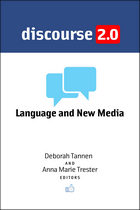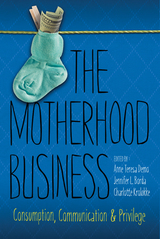
Our everyday lives are increasingly being lived through electronic media, which are changing our interactions and our communications in ways that we are only beginning to understand. In Discourse 2.0: Language and New Media, editors Deborah Tannen and Anna Marie Trester team up with top scholars in the field to shed light on the ways language is being used in, and shaped by, these new media contexts.
Topics explored include: how Web 2.0 can be conceptualized and theorized; the role of English on the worldwide web; how use of social media such as Facebook and texting shape communication with family and friends; electronic discourse and assessment in educational and other settings; multimodality and the "participatory spectacle" in Web 2.0; asynchronicity and turn-taking; ways that we engage with technology including reading on-screen and on paper; and how all of these processes interplay with meaning-making.
Students, professionals, and individuals will discover that Discourse 2.0 offers a rich source of insight into these new forms of discourse that are pervasive in our lives.

Language in Use creatively brings together, for the first time, perspectives from cognitive linguistics, language acquisition, discourse analysis, and linguistic anthropology. The physical distance between nations and continents, and the boundaries between different theories and subfields within linguistics have made it difficult to recognize the possibilities of how research from each of these fields can challenge, inform, and enrich the others. This book aims to make those boundaries more transparent and encourages more collaborative research.
The unifying theme is studying how language is used in context and explores how language is shaped by the nature of human cognition and social-cultural activity. Language in Use examines language processing and first language learning and illuminates the insights that discourse and usage-based models provide in issues of second language learning. Using a diverse array of methodologies, it examines how speakers employ various discourse-level resources to structure interaction and create meaning. Finally, it addresses issues of language use and creation of social identity.
Unique in approach and wide-ranging in application, the contributions in this volume place emphasis on the analysis of actual discourse and the insights that analyses of such data bring to language learning as well as how language shapes and reflects social identity—making it an invaluable addition to the library of anyone interested in cutting-edge linguistics.

The Motherhood Business follows the harried mother’s path into the anxious maelstrom of intelligent toys, healthy foods and meals, and educational choices. It also traces how some enterprising mothers leverage cultural capital and rhetorical vision to create thriving baby- and child-based businesses of their own, as evidenced by the rise of mommy bloggers and “mompreneurs”over the last decade.
Starting with the rapidly expanding global fertility market, The Motherhood Business explores the intersection of motherhood, consumption, and privilege in the context of fertility tourism, international adoption, and transnational surrogacy. The synergy between motherhood and the marketplace demonstrated across the essays affirms the stronghold of “intensive mothering ideology” in decisions over what mothers buy and how they brand their businesses even as that ideology evolves. Across diverse contexts, the volume also identifies how different forms or privilege shape how mothers construct their identities through their consumption and entrepreneurship.
Although social observers have long commented on the link between motherhood and consumerism, little has been written within the field of rhetoric. Penetrating and interdisciplinary, The Motherhood Business illuminates how consumer culture not only shapes contemporary motherhood but also changes in response to mothers who constitute a driving force of the economy.
READERS
Browse our collection.
PUBLISHERS
See BiblioVault's publisher services.
STUDENT SERVICES
Files for college accessibility offices.
UChicago Accessibility Resources
home | accessibility | search | about | contact us
BiblioVault ® 2001 - 2024
The University of Chicago Press









